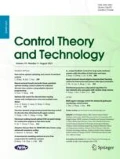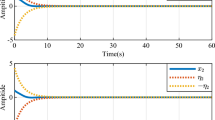Abstract
In this paper, we present an output regulation method for unknown cyber-physical systems (CPSs) under time-delay attacks in both the sensor-to-controller (S-C) channel and the controller-to-actuator (C-A) channel. The proposed approach is designed using control inputs and tracking errors which are accessible data. Reinforcement learning is leveraged to update the control gains in real time using policy or value iterations. A thorough stability analysis is conducted and it is found that the proposed controller can sustain the convergence and asymptotic stability even when two channels are attacked. Finally, comparison results with a simulated CPS verify the effectiveness of the proposed output regulation method.







Similar content being viewed by others
References
Mahmoud, M. S., Hamdan, M. M., & Baroudi, U. A. (2019). Modeling and control of cyber-physical systems subject to cyber attacks: A survey of recent advances and challenges. Neurocomputing, 338, 101–115.
Jazdi, N. (2014). Cyber physical systems in the context of Industry 4.0. In IEEE International Conference on Automation, Quality and Testing, Robotics (pp. 1–4). Cluj-Napoca, Romania.
Cintuglu, M. H., Mohammed, O. A., Akkaya, K., & Uluagac, A. S. (2016). A survey on smart grid cyber-physical system testbeds. IEEE Communications Surveys& Tutorials, 19(1), 446–464.
Xiong, G., Zhu, F., Liu, X., Dong, X., Huang, W., Chen, S., & Zhao, K. (2015). Cyber-physical-social system in intelligent transportation. IEEE/CAA Journal of Automatica Sinica, 2(3), 320–333.
Zhang, Y., Qiu, M., Tsai, C. W., Hassan, M. M., & Alamri, A. (2015). Health-CPS: Healthcare cyber-physical system assisted by cloud and big data. IEEE Systems Journal, 11(1), 88–95.
Wu, G., Sun, J., & Chen, J. (2016). A survey on the security of cyber-physical systems. Control Theory and Technology, 14(1), 2–10.
NSFOCUS (2020). An Observation on Cyber Security Incidents. https://nsfocusglobal.com/2020-an-observation-on-cyber-security-incidents.
Langner, R. (2011). Stuxnet: Dissecting a cyberwarfare weapon. IEEE Security& Privacy, 9(3), 49–51.
Sargolzaei, A., Yen, K. K., & Abdelghani, M. N. (2016). Preventing time-delay switch attack on load frequency control in distributed power systems. IEEE Transactions on Smart Grid, 7(2), 1176–1185.
Rahimi, K., Parchure, A., Centeno, V., & Broadwater, R. (2015). Effect of communication time-delay attacks on the performance of automatic generation control. In 2015 North American Power Symposium (NAPS) (pp. 1–6). Charlotte, NC, USA.
Lou, X., Tran, C., Tan, R., Yau, D. K., Kalbarczyk, Z. T., Banerjee, A. K., & Ganesh, P. (2020). Assessing and mitigating impact of time delay attack: case studies for power grid controls. IEEE Journal on Selected Areas in Communications, 38(1), 141–155.
Bianchin, G., & Pasqualetti, F. (2018). Time-delay attacks in network systems. In Cyber-Physical Systems Security (pp. 157–174). Springer
Chen, B., Ho, D. W., Zhang, W. A., & Yu, L. (2019). Distributed dimensionality reduction fusion estimation for cyber-physical systems under DoS attacks. IEEE Transactions on Systems, Man, and Cybernetics: Systems, 49(2), 455–468.
Lai, S., Chen, B., Li, T., & Yu, L. (2018). Packet-based state feedback control under DoS attacks in cyber-physical systems. IEEE Transactions on Circuits and Systems II: Express Briefs, 66(8), 1421–1425.
Zhang, H., & Zheng, W. X. (2018). Denial-of-service power dispatch against linear quadratic control via a fading channel. IEEE Transactions on Automatic Control, 63(9), 3032–3039.
Gao, L., Chen, B., & Yu, L. (2020). Fusion-based FDI attack detection in cyber-physical systems. IEEE Transactions on Circuits and Systems II: Express Briefs, 67(8), 1487–1491.
Li, Q., Xu, B., Li, S., Liu, Y., & Cui, D. (2018). Reconstruction of measurements in state estimation strategy against deception attacks for cyber physical systems. Control Theory and Technology, 16(1), 1–13.
Chen, B., Ho, D. W., Hu, G., & Yu, L. (2018). Secure fusion estimation for bandwidth constrained cyber-physical systems under replay attacks. IEEE Transactions on Cybernetics, 48(6), 1862–1876.
Nilsson, J., Bernhardsson, B., & Wittenmark, B. (1998). Stochastic analysis and control of real-time systems with random time delays. Automatica, 34(1), 57–64.
Qi, Q., & Zhang, H. (2017). Output feedback control and stabilization for networked control systems with packet losses. IEEE Transactions on Cybernetics, 47(8), 2223–2234.
Zhang, W. A., & Yu, L. (2010). A robust control approach to stabilization of networked control systems with short time-varying delays. Acta Automatica Sinica, 36(1), 87–91.
Zhang, H., Zhang, Z., Wang, Z., & Shan, Q. (2015). New results on stability and stabilization of networked control systems with short time-varying delay. IEEE Transactions on Cybernetics, 46(12), 2772–2781.
Zhang, W. A., Yu, L., & Yin, S. (2011). A switched system approach to \({\rm H}_{\infty }\) control of networked control systems with time-varying delays. Journal of the Franklin Institute, 348(2), 165–178.
Jin, D., Yu, L., & Zhang, W. A. (2017). Stabilization of networked interconnected systems. Journal of Advanced Computational Intelligence and Intelligent Informatics, 21(2), 251–257.
Gao, W., & Jiang, Z. P. (2019). Adaptive optimal output regulation of time-delay systems via measurement feedback. IEEE Transactions on Neural Networks and Learning Systems, 30(3), 938–945.
Liu, Y., Zhang, H., Yu, R., & Qu, Q. (2018). Data-driven optimal tracking control for discrete-time systems with delays using adaptive dynamic programming. Journal of the Franklin Institute, 355(13), 5649–5666.
Zhang, H., Liu, Y., Xiao, G., & Jiang, H. (2020). Data-based adaptive dynamic programming for a class of discrete-time systems with multiple delays. IEEE Transactions on Systems, Man, and Cybernetics: Systems, 50(2), 432–441.
Fan, J., Wu, Q., Jiang, Y., Chai, T., & Lewis, F. L. (2020). Model-free optimal output regulation for linear discrete-time lossy networked control systems. IEEE Transactions on Systems, Man, and Cybernetics: Systems, 50(11), 4033–4042.
Pang, Z. H., Liu, G. P., Zhou, D., & Sun, D. (2016). Data-based predictive control for networked nonlinear systems with network-induced delay and packet dropout. IEEE Transactions on Industrial Electronics, 63(2), 1249–1257.
Abouheaf, M. I., Lewis, F. L., Mahmoud, M. S., & Mikulski, D. G. (2015). Discrete-time dynamic graphical games: model-free reinforcement learning solution. Control Theory and Technology, 13(1), 55–69.
Zhao, X., Yi, P., & Li, L. (2020). Distributed policy evaluation via inexact ADMM in multi-agent reinforcement learning. Control Theory and Technology, 18(4), 362–378.
Huang, X., & Dong, J. (2020). ADP-based robust resilient control of partially unknown nonlinear systems via cooperative interaction design. IEEE Transactions on Systems, Man, and Cybernetics: Systems. https://doi.org/10.1109/TSMC.2020.2970040
Sutton, R. S., & Barto, A. G. (2018). Reinforcement Learning: An Introduction. Cambridge: MIT Press.
Lewis, F. L., & Vrabie, D. (2009). Reinforcement learning and adaptive dynamic programming for feedback control. IEEE Circuits and Systems Magazine, 9(3), 32–50.
Jiang, H., Zhang, H., & Xie, X. (2020). Critic-only adaptive dynamic programming algorithms applications to the secure control of cyber—physical systems. ISA Transactions, 104, 138–144.
Liu, R., Hao, F., & Yu, H. (2020). Optimal SINR-based DoS attack scheduling for remote state estimation via adaptive dynamic programming approach. IEEE Transactions on Systems, Man, and Cybernetics: Systems. https://doi.org/10.1109/TSMC.2020.2981478
Huang, X., & Dong, J. (2021). Robust dynamic actuator failure compensation control of nonlinear systems via cooperative interaction design. IEEE Transactions on Cybernetics. https://doi.org/10.1109/TCYB.2021.3049508
Bradbury, M., Leeke, M., & Jhumka, A. (2015). A dynamic fake source algorithm for source location privacy in wireless sensor networks. In IEEE Trustcom/BigDataSE/ISPA (pp. 531–538), Helsinki, Finland.
Huang, J. (2004). Nonlinear Output Regulation: Theory and Applications. Philadelphia: SIAM.
Lewis, F. L., Vrabie, D., & Syrmos, V. L. (2012). Optimal Control. New York: John Wiley & Sons Inc.
Hewer, G. (1971). An iterative technique for the computation of the steady state gains for the discrete optimal regulator. IEEE Transactions on Automatic Control, 16(4), 382–384.
Lancaster, P., & Rodman, L. (1995). Algebraic Riccati Equations. Oxford: Clarendon Press.
Wang, D., & Mu, C. (2018). Adaptive-critic-based robust trajectory tracking of uncertain dynamics and its application to a springCmassCdamper system. IEEE Transactions on Industrial Electronics, 65(1), 654–663.
Modares, H., & Lewis, F. L. (2014). Optimal tracking control of nonlinear partially-unknown constrained-input systems using integral reinforcement learning. Automatica, 50(7), 1780–1792.
Acknowledgements
This work was supported by the National Natural Science Foundation of China (Nos. 61973277, 62073292) and in part by the Zhejiang Provincial Natural Science Foundation of China (No. LR20F030004).
Author information
Authors and Affiliations
Corresponding author
Rights and permissions
About this article
Cite this article
Jin, D., Chen, B., Yu, L. et al. Adaptive output regulation for cyber-physical systems under time-delay attacks. Control Theory Technol. 20, 20–31 (2022). https://doi.org/10.1007/s11768-021-00072-w
Received:
Revised:
Accepted:
Published:
Issue Date:
DOI: https://doi.org/10.1007/s11768-021-00072-w




